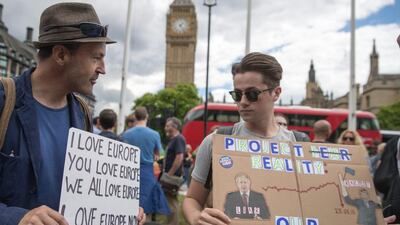How do you go from being part of a vast trading bloc with 500 million potential customers to a line trader with potentially none? Britain is about to find out.
The UK sends 44 per cent of its exports to the EU, while only eight per cent of EU exports go to Britain. This imbalance is clearly disadvantageous as Britain seeks to forge a new trade deal with the EU and could also be a problem when negotiating with non-EU countries.
But it could also work in Britain’s favour, as an important export market for the EU. But striking any deal with the remaining members of the union will take at least two years and as many as five because of all the different priorities of the remaining member states. It might well be quicker and more fruitful for Britain to focus on negotiating trade agreements with other nations, such as the US and China. These are the main options open to a post-Brexit Britain.
The Norway option
Norway is not in the EU but it is a member of the European Economic Area (EEA), a body which allows access to the EU market as long as Norway plays by EU rules, with certain exceptions to do with fishing and agriculture. The agreement between Norway and the EU adapts automatically as the EU changes so there is no need for constant renegotiation.
Iceland and tiny Liechtenstein have the same deal and all three are very prosperous.
On the minus side, though they are technically outside the EU, they still have to abide by decisions made in Brussels without having any say in reaching those decisions. They must also accept basic EU principles, including the free movement of labour. Since immigration was such a big issue in Brexit, that would be a bitter pill for the UK to swallow. Norway also pays into EU and its contribution per capita is as big as Britain’s.
The Swiss option
This is a more flexible version of the Norway option. Like the members of the EEA, the Swiss get access to EU markets in exchange for obeying EU rules. But they can make bilateral agreements with individual countries, and also choose which of the EU rules they want to follow.
In 2014 Switzerland voted to impose limitations on immigration from within the EU. No EU member state could do that without being in violation of the EU treaty.
However this pick-and-mix approach entails constant negotiation and Brussels is so fed up with it that the EU is unlikely to allow the same arrangement to occur again with another country.
Like the members of EEA, the Swiss have no formal say in making EU law and the trade agreement with the EU excludes services, which are 80 per cent of the British economy. Swiss banks cannot provide cross-border services and so have to set up subsidiaries in EU countries, which adds considerably to their running costs.
The Canada option
This deal, which comes into effect this year, eliminates nearly all tariffs on goods and is championed by chief Leave campaigner Boris Johnson, who extolled it as proof that it was possible to trade with the EU and also control one’s own borders.
Under this option, Britain would have no obligation to allow workers in from across the EU or pay into the EU budget.
However, the agreement leaves out almost all services. Banks would not have the same access to the EU, meaning Britain’s financial services industry would suffer badly. Britain’s chancellor of the exchequer (finance minister) George Osborne says a Canada-style agreement would shrink the UK economy by more than six per cent within 15 years.
Another downside is that the Canada agreement took five years to negotiate. Any similar deal between the UK and EU would probably take longer.
The World Trade Organisation option
If negotiation with the EU fails, Britain could fall back on WTO rules for trade with EU members. There would be no more bowing to Brussels and Brexiteers point out that tariffs on goods traded between wealthy countries are much lower than they were.
However, this would also entail marathon negotiations and Britons could lose the right to live, work and study in continental Europe without a reciprocal agreement with EU countries.
The bespoke option
Individual industries with large numbers of UK customers, such as German carmakers or French wine-makers, could press their governments to strike deals with Britain rather than punish it for leaving, but the price might still include the free movement of people and contributions to the EU budget.
Bosnia, Serbia, Albania and Ukraine have their own trade arrangements with the EU but the economies of those countries are not really comparable to Britain’s.
The got-it-alone option
Britain would forge its own agreements deals with the 50-plus non-EU countries which have deals with Europe but also focus on countries which do not currently have one, especially China and the US. In April, President Barack Obama warned that a Britain outside the EU would go to the “back of the queue”, but he has only a few months left in office and his successor might take a different view — assuming the president really meant what he said in the first place.
The downside is that it would take a long time and the US is in the throes of concluding a wide-ranging trade and investment deal with the EU.
* With reporting by Reuters
foreign.desk@thenational.ae

